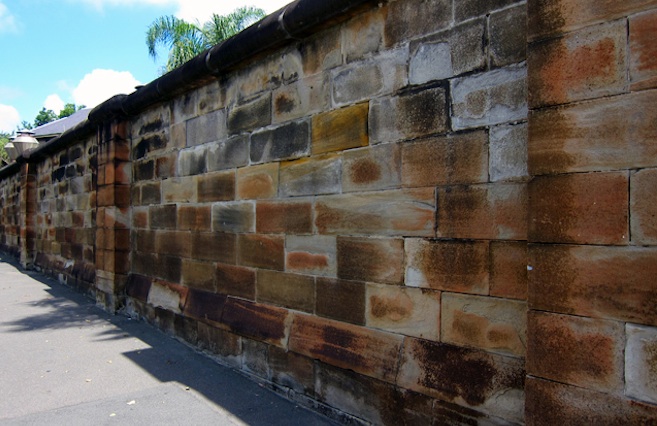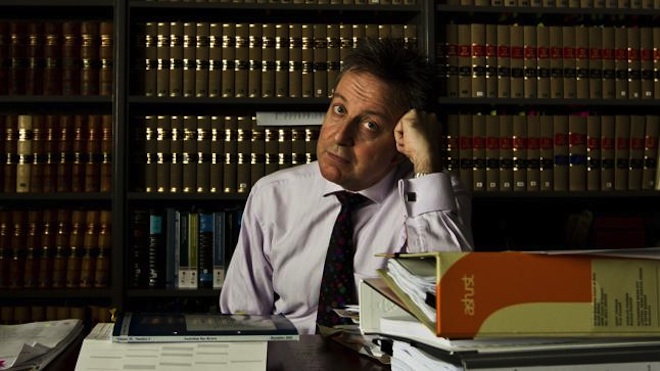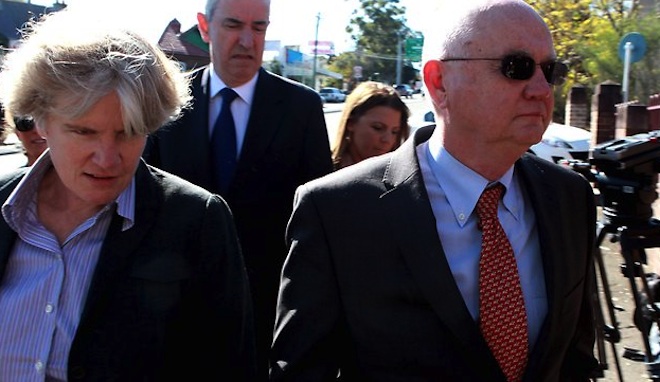Appeal judge airs his knowledge of gay beats ... A family of "Best Lawyers" ... Drink-drive judge mentoring other judges ... New book takes us behind the scenes at the Judicial Commission ... Truly breathtaking arrogance
 The Wall, Darlinghurst: beat of "dogs and perverted people" (pic, William Feueman for Untapped Cities)
The Wall, Darlinghurst: beat of "dogs and perverted people" (pic, William Feueman for Untapped Cities)
WHAT can we make of NSW acting appeal judge Admiral Murray Tobias' knowledge of gay beats?
On April 10, in the second round appeal in the interminable Keysar Trad v 2GB defamation case, the normally sensitive and caring Tobias let fly with an observation about gays that seems out of kilter with contemporary notions of inclusiveness.
The broadcaster is trying to defend imputations that Trad, a spokesman for the Muslim community, is actually a dangerous and disgraceful individual who incites people to commit acts of violence and to have racist attitudes.
The case went to the High Court, which found the Court of Appeal earlier erred in overturning the trial judge's findings of truth and by applying the test of the "right thinking person" to all the imputations.
The High Court majority said the trial judge, Peter McClellan, had correctly decided the truth of the imputations dealing with incitement to violence, racist attitudes and being a dangerous individual.
However, he applied to wrong test to another imputation, that Trad "is a disgraceful individual", because the character of that imputation was "evaluative".
The High Court sent it back to the Court of Appeal to have another go at working it out.
If the hearing on April 10 is anything to go by the appeal judges are peeved at the meddling by the people in Canberra.
According to our sister organ, the Gazette of Law & Journalism, Richard McHugh SC for 2GB, submitted that the Court of Appeal's task was to revisit the primary findings of fact for the first three imputations and apply a different test to the remaining "disgraceful individual imputation".
He argued that a correct reading of the findings of fact would inevitably lead to the establishment of the truth of all the imputations.
For instance, he described a "thesis" on homosexuality written by Trad as, "dangerous ... [full of] gross misinformation [and a clear example of] crossing the line".
He took the court to Trad's characterisation of homosexuals as "dogs" and "perverted people prowling for prey".
Admiral Tobias responded:
"But some are - up near St Vincent's, that's what they do. It's called The Wall, I think."
Air was sucked-in around the courtroom and Justice Ruth McColl couldn't quite restrain one of her famous grimaces.
* * *
 Leopold: TV star and one half of a "best lawyer" team (pic - Financial Review)
Leopold: TV star and one half of a "best lawyer" team (pic - Financial Review)
IT WAS nice to see hubby and wife combo Alec Leopold and Leanne Norman land separate spots in the Financial Review's "Best Lawyers" wrap.
Is this a record to have two legal luminaries in the one household, both getting gold elephant stamps from the media?
Leopold, at the bar and grill, was identified as a litigation whizz, with a cases involving Nathan Tinkler, Brett Lee and Michael Slater, among a heap of others.
In high profile cases that attract the attention of the reptiles of the press he said it's important not to fall for the trap of saying things in court just to get a quote in the papers.
Anyway, he added that his most pleasurable work sails under the radar:
"I really enjoy what I would call a standard piece of commercial litigation."
Media lawyer wife Leanne Norman used to be at Mallesons Stephen Jaques in the good old days, but went to Freehills when the Fairfax media work moved there.
Soon after most of the Fairfax work was snitched by John Winter & Slattery under the baton of Mark O'Brien. Norman was left with the Financial Review and other business publications in the group.
As Freehills was climbing into bed with Herbert Smith, Norman bailed and moved to boutique media and IP shop, Banki Haddock Fiora.
Her timing was impeccable, because in short order JWS was de-retained by Fairfax, which moved all its publications to BHF.
Leanne is hugely busy again.
* * *
 Howie (right): suffering anxiety
Howie (right): suffering anxiety
FORMER NSW Supremo Rod (The God) Howie may have stepped down from the Law Reform Commission and the Sentencing Council after his unfortunate drink-drive conviction in September 2011, but he retains a gig with the Judicial Commission.
He's a contracted judicial mentor and consultant working on the commission's bench books - aids for judges in different jurisdictions, including: civil, criminal, local court, sentencing, sexual assault and equality before the law.
Rod, who was an acting appeal judge at the time of the offence, pleaded guilty to mid-range drink driving.
Mention was made at the time that he also served on the appeal bench that came up with the guideline judgment for sentencing in high-range drink driving cases.
The night before the Buster Keatonesque routine in his car he had knocked-back a bottle of red over four hours, accompanied by a "light and easy Thai chicken meal", plus his usual pills for anxiety and sleeplessness.
Early next morning he was in his auto careering into a truck, then driving along a footpath for 15 metres, zipping across four lanes into oncoming traffic before colliding with a car, which collided with another vehicle.
The coppers said the judge was, "unsteady on his feet, his face flushed and his eyes watery".
His eyes watered even more when he discovered the damages bill was about $100,000, including $65,000 worth of dings to his own motor, which wasn't insured.
The beak at Ryde Local Court said it was all very serious and slotted Rod for 100 hours of community service and not to climb behind a steering wheel for six months.
Shortly after this embarrassing appearance a well-meaning Supreme Court judge organised some friendly drinks for Howie and a few other commiserating jurists.
* * *
ALL of which is a long-winded way into mentioning Lyn Gain's new book, Witch Girl and The Push - Social History As You've Never Read It.
Gain was director of the New South Wales Council of Social Service and had been appointed by attorney general John Hannaford as the first lay member of the NSW Judicial Commission, during the time of Smiler Gleeson's tenure as head of the JC.
Much of her book is taken up with the horizontal adventures of a pack of hoary narcissists and their doxies - i.e. The Sydney Push.
However, two valuable pages are devoted to her experience as a member of the judicial commission.
It's the first public slice of life that takes us behind the scenes of this secretive outfit. It is not a pretty sight.
"Murray Gleeson was then the chief justice and was really quite charming and amusing if you could get over his truly breathtaking arrogance.
I am told that this is a common condition among members of the legal fraternity, but I have never come across its like before or since."
Gain tells of the procedures of the commission where complaints are processed, reports written and then letters prepared for sending to the complainant and the judicial officer in each case.
At her first meeting the commission was preparing a letter to be sent to magistrate Pat O'Shane, rebuking her for some "minor behavioural matter".
"I remarked that this letter seemed to be a little arrogantly worded. After some exchanged glances around the room, Murray Gleeson said that perhaps they had intended to sound arrogant."
On another occasion the commission was dealing with a complaint about a magistrate who heard a domestic violence case.
He granted the woman applicant an AVO, but she said that if ever her husband hit her again she would leave the marriage.
The magistrate proceeded to lecture her about the importance of the institution of marriage and told her that "it takes two to tango".
The only other woman on the commission at that time was Marla Pearlman from the Land and Environment Court, but she was away for this meeting.
Gain had trouble getting the male judges to see that a magistrate had no right to tell a woman to put up with domestic violence.
Murray Gleeson was convinced that it was an "inoffensive little homily on the virtues of marriage". Reg Blanch from the Dizzo and Bill Fisher from the Industrial Court (and an old Andersonian) went along with Smiler.
"All I could do was exchange glances of disbelief with the female minute-taker to the commission as we shook our heads."